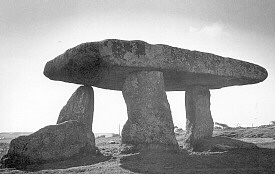Template:Stones upon
Stone upon a stone

The idea of a stone upon a stone[1] had a double meaning. Christ prophesied the destruction of the temple, but also it was the end to the domination of an hierarchy that exercised authority one over the other.
There was an hierarchy within the Church, but it was not a system where men rule over one another, but it was a system of government where the "greatest among you" was great because he "doth serve".[2]
The Bible is filled with Allegory and Metaphor, which can allow Sophistry to produce a Strong delusion in the minds of the people.
If the Altars of Clay and Stone were not just piles of dirt and rocks, why were they made of unhewn stones?
If a gathering of stones was a company of men, then what were the Stones that Jesus was tempted to turn into bread?
What was the Golden calf and the sacrifice of the Red Heifer, and why did the people have to sew the Breeches of the Levites?
And if the Lively stones were people, did Stoning originally mean a practice that did not include hitting people with rocks until they were physically dead?
Finding the answers to these questions may make it clear who Christ appointed and why and what they were to do and how they were to do it. The Minsters appointed by Christ were to be benefactors of the people, but they were to do so without exercising authority, forcing contributions or ruling over the people.
- ↑ Matthew 24:2 And Jesus said unto them, See ye not all these things? verily I say unto you, There shall not be left here one stone upon another, that shall not be thrown down.
- Mark 13:2 And Jesus answering said unto him, Seest thou these great buildings? there shall not be left one stone upon another, that shall not be thrown down.
- Luke 19:44 And shall lay thee even with the ground, and thy children within thee; and they shall not leave in thee one stone upon another; because thou knewest not the time of thy visitation.
- Luke 21:6 As for these things which ye behold, the days will come, in the which there shall not be left one stone upon another, that shall not be thrown down.
- ↑ Luke 22:26 But ye [shall] not [be] so: but he that is greatest among you, let him be as the younger; and he that is chief, as he that doth serve. 27 For whether [is] greater, he that sitteth at meat, or he that serveth? [is] not he that sitteth at meat? but I am among you as he that serveth.